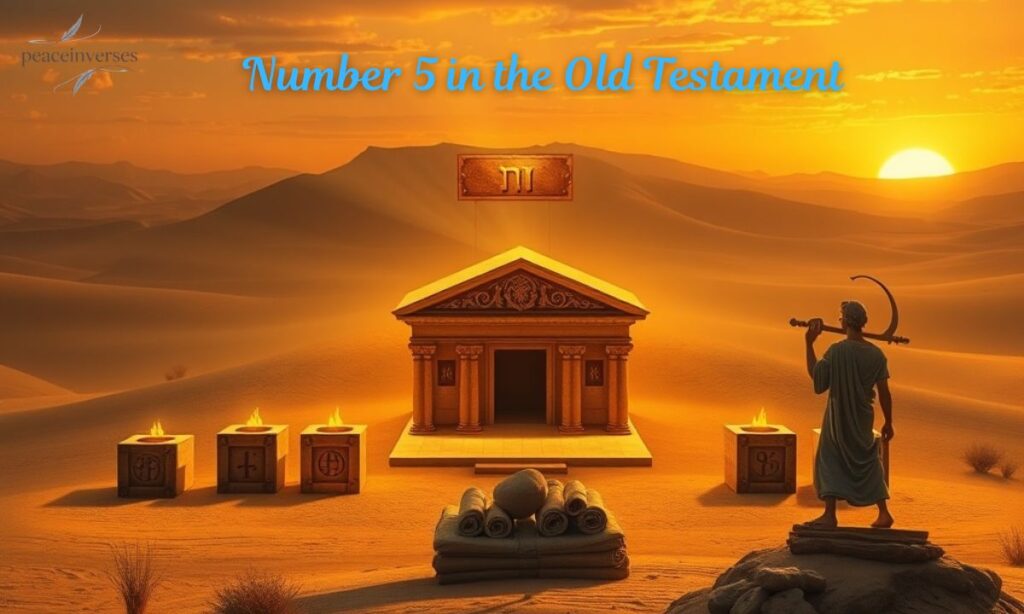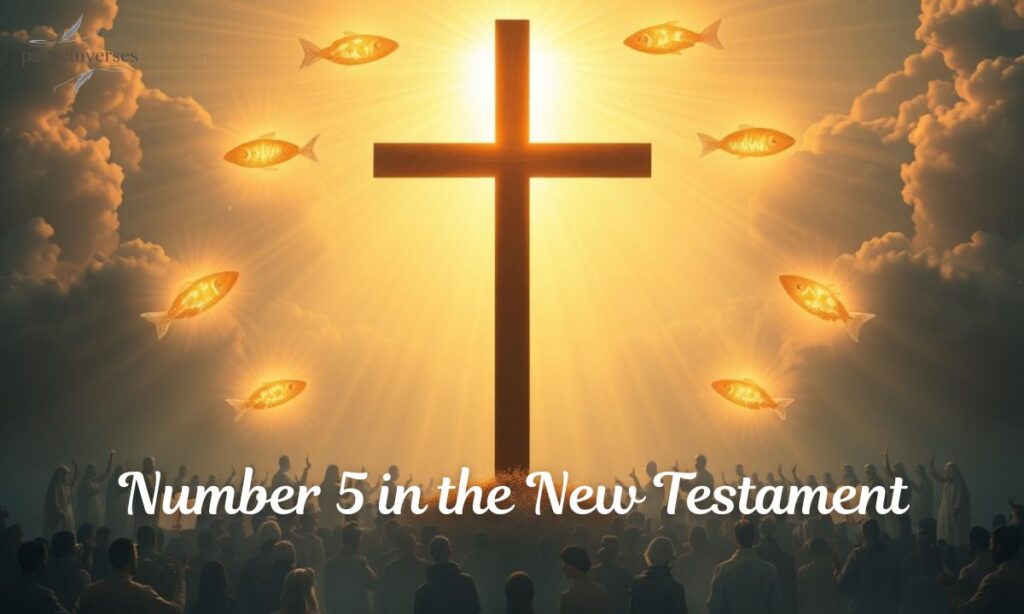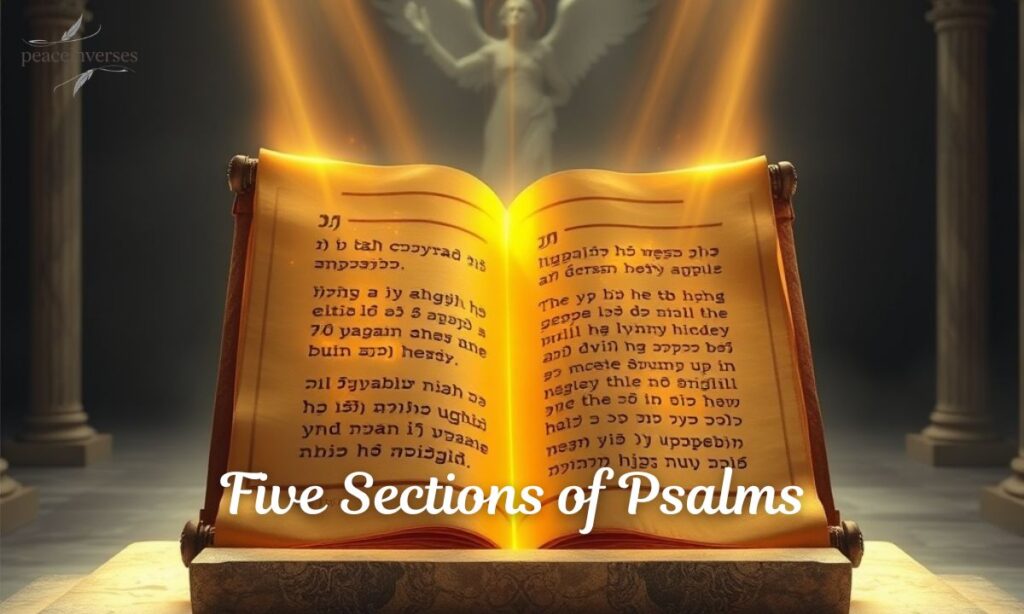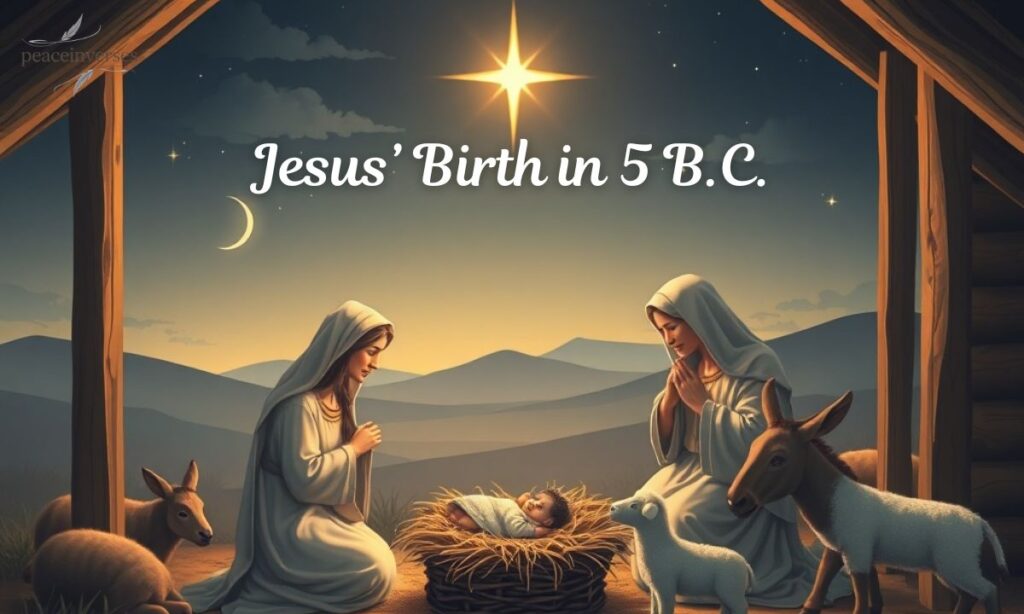Numbers in Scripture are rarely random—they often carry a spiritual depth that reveals God’s plan. The number 5 is one of those powerful symbols, pointing us to grace, provision, and divine order woven throughout the Bible.
From the five books of the Torah to Jesus feeding the multitude with five loaves of bread, this number appears again and again with purpose. Exploring it helps us see how God’s grace is not just a theme but a pattern written into His Word.
Biblical Meaning of Number 5
The number 5 in the Bible is often seen as a symbol of grace, kindness, and divine favor. It is tied to God’s blessings and His unearned mercy. Interestingly, the number 5 appears 345 times in the King James Bible, highlighting its deep spiritual importance.
Grace and Divine Favor
The number 5 reflects God’s unending mercy that cannot be earned. It reminds believers of His goodness and generosity in every season of life. In Scripture, grace is multiplied when 5 is repeated, showing abundance and fullness in Christ.
- 5 x 5 = 25 points to grace upon grace, a double portion of God’s favor.
- Jesus showed grace in miracles, including feeding the multitude with five loaves.
- The Ten Commandments were written on two tablets of five each, reflecting order and balance.
“From His fullness we have all received, grace upon grace.” — John 1:16
God uses the number 5 to remind His people that His favor is not limited. It pours out daily, guiding, protecting, and sustaining lives beyond human strength.
Hebrew Letter Hei
The number 5 is linked to the Hebrew letter Hei (ה), a letter that carries the meaning of breath, spirit, and revelation. It symbolizes God’s presence moving among His people. Hei represents the divine breath that brings both life and understanding.
In Hebrew tradition, Hei is often tied to:
- God’s name (YHWH), showing His holiness and nearness.
- Divine revelation, opening hearts to His Word.
- Breath of life, symbolizing creation and renewal.
Through the letter Hei, the number 5 reminds us that God is active and near. His Spirit continues to breathe truth and strength into those who walk in faith. It shows His desire to be present in both the ordinary and the sacred moments of life.
Number 5 in the Old Testament

In the Old Testament, the number 5 carries powerful meaning tied to God’s grace, order, and preparation. It appears in offerings, sacred structures, laws, and even in stories of faith. Each instance reflects how God’s favor and wisdom guide His people.
Five Offerings in Leviticus
The book of Leviticus outlines five main offerings—burnt, grain, peace, sin, and trespass. Each offering carried spiritual significance, showing God’s desire for mercy and reconciliation with His people. These offerings taught Israel about worship, forgiveness, and gratitude.
- Burnt Offering – symbol of total surrender.
- Grain Offering – thanksgiving for God’s provision.
- Peace Offering – fellowship with God and others.
- Sin Offering – atonement for sin.
- Trespass Offering – forgiveness for specific wrongs.
Together, these five offerings reveal God’s graceful plan of redemption, pointing forward to the ultimate sacrifice in Christ.
The system of five offerings reminded Israel that forgiveness and peace were possible through faith. It was an early display of God’s grace upon grace.
Five Books of the Pentateuch
The foundation of the Old Testament is the five books of the Torah: Genesis, Exodus, Leviticus, Numbers, and Deuteronomy. These books give the law, history, and guidance that shaped Israel’s faith and identity.
- Genesis – God’s creation and covenant.
- Exodus – deliverance and law given.
- Leviticus – holiness and worship.
- Numbers – wandering and testing.
- Deuteronomy – covenant renewed.
These five books form the heart of God’s instruction, blending law with grace. They prepare His people for covenant living and reveal His desire for obedience rooted in love.
The Pentateuch highlights that God’s grace is always present—even in law—because His commands were given to bring life, not burden.
Tabernacle’s Design
The Tabernacle was built with exact measurements and details, many of which involved the number 5. Its design revealed God’s order, holiness, and presence among His people.
- Five curtains covered the Tabernacle (Exodus 26:3).
- The altar was five cubits wide (Exodus 27:1).
- The holy anointing oil used five main ingredients (Exodus 30:23–25).
The repeated use of 5 in the Tabernacle showed that worship required both grace and order. God’s dwelling place was carefully prepared so His people could approach Him in holiness.
Through the Tabernacle’s design, the number 5 symbolized God’s divine structure and presence guiding Israel in worship.
David’s Five Smooth Stones
In 1 Samuel 17:40, David chose five smooth stones before facing Goliath. This choice symbolized faith, preparation, and reliance on God’s grace rather than human strength.
David did not depend on armor or sword but trusted God’s power. The five stones represented readiness and God’s provision for victory.
Though David only used one stone, the act of taking five showed wisdom in preparation. It reflected that true courage comes when faith and action work together.
The story reminds us that with God’s grace, even small things—like five stones—can overcome the greatest giants in life.
Number 5 in the New Testament

In the New Testament, the number 5 carries deep meaning through Jesus’ miracles, sacrifice, and teachings. It appears in stories of grace, provision, and preparation, each pointing to God’s abundant mercy and the call to live in faith.
Jesus’ Five Wounds
The five wounds of Jesus—in His two hands, two feet, and side—stand as eternal symbols of sacrificial love. They remind us that salvation came through suffering and that His grace was poured out fully for all people.
- Two hands pierced for our deeds.
- Two feet pierced for our walk.
- One side pierced, releasing blood and water.
These wounds reflect the cost of redemption. They show that through His pain, humanity received the greatest gift—grace and eternal life.
By His wounds we are healed, both body and soul. His five wounds are not only marks of suffering but signs of victory and mercy.
Five Loaves and Two Fish
In Matthew 14:13–21, Jesus fed 5,000 people with five loaves and two fish. This miracle revealed God’s ability to provide abundantly from the smallest offering placed in His hands.
The five loaves symbolized grace multiplied. Though the food seemed little, Christ’s blessing turned it into more than enough.
- Five loaves – symbol of provision.
- Two fish – symbol of partnership and faith.
- Leftovers – God’s blessings overflow.
This miracle shows that when we surrender what we have, God turns it into blessings for many. The number 5 here points to divine provision that never runs dry.
The lesson reminds us that God’s grace takes the ordinary and makes it extraordinary.
Five Wise and Five Foolish Virgins
In Matthew 25:1–13, Jesus shared the parable of the five wise and five foolish virgins. It teaches the importance of being spiritually ready for the coming of the Lord.
The five wise virgins represent faithfulness and preparation, while the five foolish represent neglect and unprepared hearts.
- Five wise – carried oil, symbol of the Spirit.
- Five foolish – lacked oil, symbol of neglect.
- The bridegroom – Christ, who returns at an unexpected hour.
This parable balances grace with responsibility. Salvation is a gift, but faith requires readiness and commitment.
The number 5 here shows both sides of human response—prepared and unprepared—for God’s kingdom.
Fivefold Ministry
In Ephesians 4:11–13, Paul describes the fivefold ministry as God’s design for building up the Church. These roles help believers grow in unity, maturity, and spiritual strength.
- Apostles – sent to establish the Church.
- Prophets – reveal God’s word and direction.
- Evangelists – spread the gospel.
- Pastors – shepherd and care for believers.
- Teachers – instruct and ground the Church in truth.
The number 5 here shows God’s perfect balance in ministry. Each role works together to reflect His grace and equip His people.
This structure demonstrates God’s order, ensuring the Church grows strong and reflects Christ’s fullness on earth.
Five Sections of Psalms

The book of Psalms is divided into five sections: 1–41, 42–72, 73–89, 90–106, and 107–150. These divisions mirror the five books of the Pentateuch, showing God’s divine order in worship and praise. Each section ends with a doxology, giving glory to the Lord.
- Section 1: Psalms 1–41
- Section 2: Psalms 42–72
- Section 3: Psalms 73–89
- Section 4: Psalms 90–106
- Section 5: Psalms 107–150
Together, these parts reflect worship in every season of life—joy, sorrow, repentance, and thanksgiving. They guide believers to seek God in all circumstances.
Ten Commandments in Two Sets
The Ten Commandments are divided into two groups of five, balancing worship of God with love toward others. The first five commandments focus on devotion to God, while the last five highlight how we treat people.
- First five – relationship with God.
- Last five – relationship with others.
- Balance – love God and love neighbor.
This order shows God’s wisdom in creating a covenant of faith and ethics. Obedience is both vertical (toward Him) and horizontal (toward others).
Prophetic World Empires
In Daniel 2, prophecy reveals five world empires that would rise before God’s eternal kingdom. Each kingdom symbolized power, yet all were temporary before Christ’s reign.
- Babylon
- Persia
- Macedonia (Greece)
- Rome
- Successors
These empires show history unfolding under God’s control. They remind us that no human kingdom lasts forever, but the kingdom of God will never end.
Adversary and Antichrist References
The New Testament mentions the adversary, antichrist, and demons in a fivefold pattern. These terms highlight spiritual opposition that believers must resist through faith.
- “Antidikos” (adversary)
- “Antichristos” (antichrist)
- “Daimon” (demon)
- Fivefold mention emphasizes warning
- Victory is promised in Christ
These references show that while opposition is real, God’s people are called to stand firm. Through Christ’s power, the adversary cannot overcome.
Jesus’ Birth in 5 B.C.

Many scholars suggest Jesus was born in 5 B.C., possibly on the Feast of Trumpets. This timing aligns with the number 5 as a symbol of grace and divine order.
- Year: 5 B.C.
- Feast: Trumpets (Rosh Hashanah)
- Symbol: Grace and new beginning
- Prophecy: Fulfilled in Christ
- Divine timing: Perfectly aligned
The connection between His birth and the number 5 shows God’s hand in history. It marks the arrival of grace and salvation for all.
Life Applications of Number 5
The number 5 carries practical lessons for every believer. It calls us to live in God’s grace, walk in daily readiness, and trust His endless provision. Each lesson is rooted in Scripture, reminding us that His order and mercy guide every step of life.
Walk in God’s Grace
God’s grace is greater than guilt, and the number 5 points us back to that truth. The five wounds of Jesus remind us that forgiveness is already paid for at the cross. We are called to walk free, receiving His mercy without fear or shame.
- Five wounds: hands, feet, and side.
- Each wound a mark of love and sacrifice.
- Grace cannot be earned, only received.
- Believers are invited into freedom, not bondage.
- Forgiveness is complete in Christ.
Living in grace means embracing God’s love daily, knowing that His sacrifice covers all sin and opens the way to new life.
Stay Spiritually Prepared
The parable of the five wise virgins teaches believers to stay ready for the Lord’s return. Preparation shows faith, while neglect leads to being unprepared when He calls. David’s choice of five smooth stones also reflects wisdom and readiness in facing trials.
- Oil in the lamps: symbol of the Spirit.
- Wise virgins: prepared for the Bridegroom.
- David’s stones: faith and preparation in action.
- Readiness keeps us strong in trials.
- God honors those who trust and prepare.
Spiritual readiness is a daily walk, choosing faith, prayer, and obedience. With preparation, believers meet challenges with courage.
Trust God’s Provision
When Jesus fed the crowd with five loaves and two fish, He revealed that God multiplies what is surrendered to Him. The number 5 here reflects divine provision for every need. Offering what we have invites God to do the impossible.
- Five loaves placed in Jesus’ hands.
- Thousands fed with abundance left over.
- God provides beyond human limits.
- Faith unlocks supernatural supply.
- Small things become great in His hands.
Trusting God’s provision means resting in His care. Whatever we give Him, He is able to multiply for His glory and our blessing.
Frequently Asked Questions
What is the significance of the number 5 in the Bible?
The number 5 symbolizes God’s grace and favor. It appears in the five offerings, the five books of the Pentateuch, and miracles like the feeding of 5,000.
What does Numbers 5 in the Bible teach?
Numbers 5 focuses on purification, confession, and restitution. It reflects God’s grace and His desire for His people to live in holiness and order.
What is the meaning of the number 5 in Hebrew?
The Hebrew letter Hei (ה) represents the number 5. It symbolizes God’s breath, presence, and revelation, showing His nearness and empowerment.
How does the number 5 connect to Jesus?
Jesus’ five wounds are a symbol of sacrificial grace. They remind believers that salvation is complete through His love and suffering on the cross.
Why is the number 5 considered a number of provision?
The miracle of the five loaves and two fish shows how God provides abundantly. Even small offerings placed in His hands can meet great needs.
Conclusion
The number 5 carries a message of grace, order, and divine provision. From the Torah to the miracles of Jesus, it reveals God’s hand in every detail of Scripture.For believers, number 5 is a reminder of God’s faithfulness. It inspires trust, encourages preparation, and shows that His grace is always more than enough.

Muhammad Shoaib is a passionate faith-based writer with over 10 years of experience in creating meaningful content centered around prayers, Bible meanings, scriptural teachings, and heartfelt wishes. He is the lead writer at PeaceInVerses.com, where he shares spiritual insights and uplifting messages to guide and inspire readers on their faith journey.

